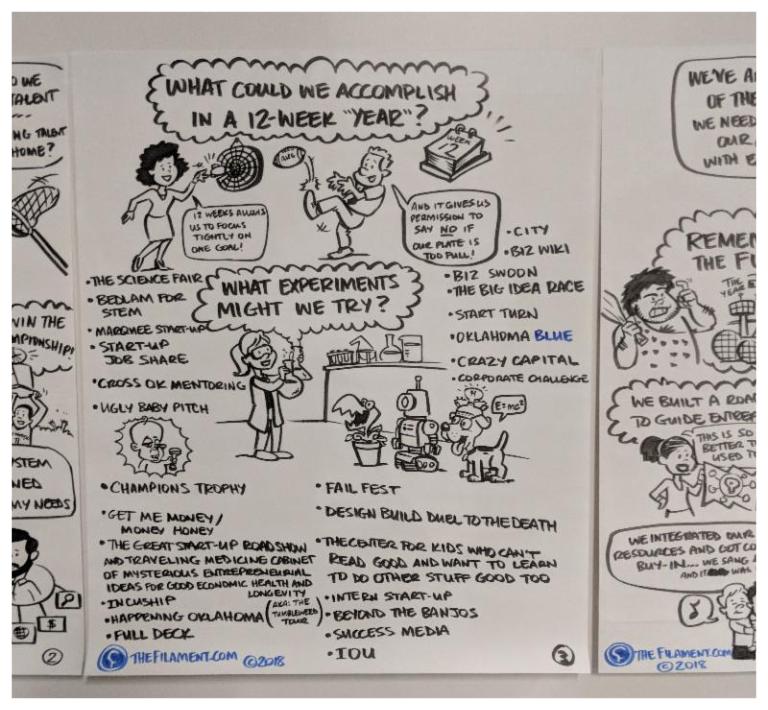This was a day-and-a-half conference/summit/workshop/brainstorm hosted by the Federal Reserve Bank in Kansas City. In addition to the Federal Reserve, the event was organized by the Kaufmann Foundation, KC SourceLink (an Entrepreneurial Service Connector), the Edward Lowe Foundation (which houses the National Center for Economic Gardening), and Network Kansas (a state-wide entrepreneurial program for Kansas). This was the second summit of this kind hosted by the Kansas City Fed, and provided an important convergence of ideas and best practices around entrepreneurship and economic development, particularly in areas similar to Oklahoma.
This sense of convergence in an area away from the typical centers of entrepreneurship (such as San Francisco) was an important working concept that served as a thematic symbol throughout the conference. There were several discussions of this sense of "center" and "edge" in how cities formerly on the "edge," such as Baltimore, Pittsburgh, Columbus, and Denver, are now centers of entrepreneurial activity, which, in turn, has created spaces in the U.S. to be fringe areas for entrepreneurial development. This feels important because of being on the fringe implies a sense of both urgency and a lack of risk. Edge places are areas where ideas and businesses can be nurtured because the cost of risk is low.
One of the most important takeaways I received from the conference was a chain of ideas advanced by Penny Lewandowski, of the Edward Lowe Foundation. Penny stated that economic growth can only occur when companies have the resources to grow, and the best way to create more resources in a community is through collaboration. This collaboration hinges on data collection, because data serves as a basis for stories, and the stories told about a community have power to shape the kind of collaboration that occurs.
Andy Stoll, with the Kaufman Foundation, also followed with a perspective on the changing geography of rural entrepreneurship by discussing a case study of Cedar Rapids, Iowa. Andy described the process after which Cedar Rapids recovered from a recent flood and wanted to build an intention ecosystem for local entrepreneurs. He began with an idea that networks were becoming more important than hierarchies in economies throughout the world and began having coffee with local entrepreneurs. He asked them two questions: "What is your story?" and "How can we help?" These informal meetings became gatherings, which then became regular coworking days. Through these informal situations, more collisions between entrepreneurs occurred which led to more collaboration and a supportive community of entrepreneurs that could share knowledge and resources.
Another highlight of the summit was a presentation by Rodney Sampson on the urban "edges" of entrepreneurship. Rodney discussed the wealth disparities in major American cities, the issue of "brain drain" in Atlanta, and how to address racial and ethnically diverse communities with entrepreneurial efforts. Rodney emphasized the economic benefits that could be gained with a more diverse group of business owners, leaders, and managers. He proposed several actionable steps that he is working to implement in Atlanta: creating early STEM exposure, creating "safe spaces" to form a business, teaching sales, being able to skill up talent, creating access to capital, and developing partnerships with existing community service providers.
Much of the conference included small group breakout sessions, and peer-learning opportunities. Overall, it was very helpful to meet people in similar situations in rural communities as they are working to create better environments for new entrepreneurs. In addition, I was struck by the importance of a physical, common space for entrepreneurs to meet, gather, and exchange ideas. Entrepreneurial ecosystems area really social systems, and common, public spaces are one of the best ways for people to learn and share information. These common experiences and interactions can lead to collaboration that ultimately create resources for business to grow.
Oklahoma Entrepreneur Roundtable, May 23rd, 2018
The Oklahoma Entrepreneur Roundtable was an event to help spark the development of a state-wide ecosystem for entrepreneurial support in Oklahoma. The event was held at Starspace 46, a new-ish cowork space west of Oklahoma City's downtown, and included a mix of attendees including entrepreneurs, economic developers, technology center staff, and policy makers.
One of things that stuck out about this event was how it was run. The day was facilitated by Matt Hoffman, who founded the Filament in St. Louis. Matt and his associate and artist/visual recorder Todd Bauman asked the assembled group to work through customized question prompts and exercises, and reformatted our responses in a visual way.

By the end of the day, I noticed the group was talking about what we could do together in the state. This is certainly an early stab at this kind of project, but it felt like the right first step towards building something that can help both metro and rural areas of Oklahoma. This also felt like a scaled down version of the Growing Entrepreneurial Communities Summit in Kansas City, but with more direct interaction between attendees.
A takeaway from both of these events was that successful programs seemed to grow out of regular and frequent interactions that create an intention to work with specific areas or communities of people. This was modeled in the case studies from Cedar Rapids, Albuquerque, Atlanta, and Puerto Rico. These interactions seem to require a shared space intended to help create the room for new programs and ideas. I observed that the intention to create more entrepreneurial activity in Oklahoma is there, and everyone that I met had a passion for encouraging new ideas and companies to be developed in the state. I gathered the sense that we need more events and workshops. We need more spaces to gather and experiment. Finally, we need to keep building a dedicated network who can help support new ideas and programs which assist entrepreneurs grow new companies.
Interested in growing your company in Ada? Let us know
HERE!